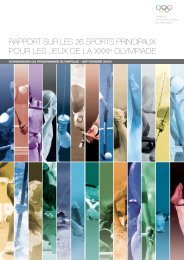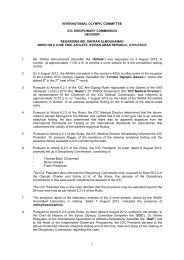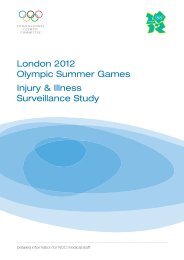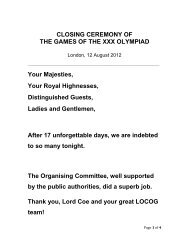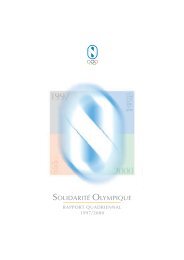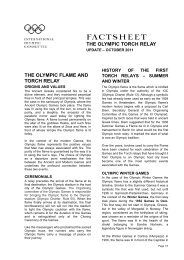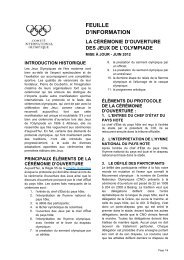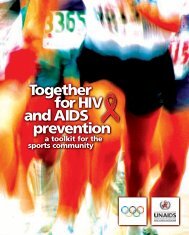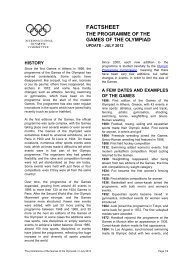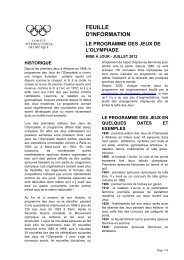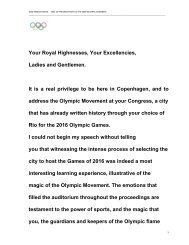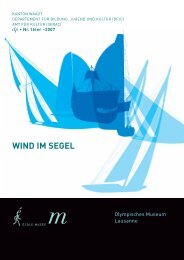Results Résultats
Results Résultats
Results Résultats
Create successful ePaper yourself
Turn your PDF publications into a flip-book with our unique Google optimized e-Paper software.
As good news never comes alone, we can also mention<br />
the achievements of our other scholarship holders, with<br />
13 other athletes offering their countries a first Olympic<br />
medal in a particular sport, such as the gold won by<br />
Romania’s Alina Dumitru in judo, the silver won by the<br />
Vietnamese Anh Hoang in weightlifting, or the bronze for<br />
Brazil’s Natalia Silva Falavigna in taekwondo.<br />
Among these exceptional results, we must mention the<br />
world records set and the three gold medals in the 100,<br />
200 and 4x 100 metres by the amazing Jamaican, Usain<br />
Bolt, who was also one of the beneficiaries of the Olympic<br />
scholarship for athletes “Beijing 2008” programme. Why<br />
should an athlete of this calibre benefit from a programme<br />
aimed at athletes in financial need, you might ask. The relationship<br />
between Olympic Solidarity and Usain Bolt began<br />
in 2003, when the Jamaican Olympic Committee asked<br />
for financial assistance to support a young athlete not<br />
known then to the general public, but who seemed to have<br />
definite potential. Step by step, the athlete developed, and<br />
it was logical that, in 2006, the NOC should request an<br />
Olympic scholarship for this young prodigy, so that he<br />
could continue along the path begun several years before.<br />
And everyone knows the rest of the story…<br />
The direct impact of the scholarship programme on the universality<br />
of the Games has always been difficult to measure,<br />
but we can say today that, after the fifth edition of the<br />
Games for which Olympic Solidarity has offered a scholarship<br />
programme, the number of medal-winning NOCs<br />
has grown steadily (64 NOCs in Barcelona, 79 in Atlanta,<br />
80 in Sydney, 74 in Athens and 87 in Beijing). If we take<br />
into account the fact that it is not possible to influence the<br />
high sports level of the Olympic competitions, that an<br />
increasing number of small NOCs are reaching the podium<br />
thanks to the results of their athletes, and that, parallel to<br />
this, the aim of the Olympic scholarships programme was<br />
to “support athletes from NOCs which need it most so that<br />
they can qualify for the Olympic Games”, we can<br />
argue, albeit with a degree of caution, that<br />
the scholarship programme today represents<br />
an important tool which has been proven to<br />
make a positive contribution to increasing<br />
the universality of the Olympic Games.<br />
Une bonne nouvelle n’arrivant jamais seule, nous pouvons<br />
continuer l’énumération des exploits accomplis par nos<br />
boursiers olympiques en relevant que treize autres athlètes<br />
ont offert à leur pays une première médaille olympique<br />
dans un sport défini; nous pouvons citer en exemple la<br />
médaille d’or remportée par la Roumaine Alina Dumitru<br />
en judo, la médaille d’argent remportée par le Vietnamien<br />
Anh Hoang en haltérophilie ou encore la médaille de bronze<br />
pour la Brésilienne Natalia Silva Falavigna en taekwondo.<br />
Parmi tous ces résultats d’exception, nous ne pouvions<br />
évincer les records mondiaux battus et les trois médailles<br />
d’or en 100, 200 et 4x 100 mètres remportées par l’époustouflant<br />
Jamaïcain Usain Bolt, qui a lui aussi bénéficié du<br />
programme de bourses olympiques pour athlètes «Beijing<br />
2008». Pourquoi un athlète de cette envergure a-t-il bénéficié<br />
d’un programme destiné à des athlètes dans le besoin<br />
financier, vous demanderez-vous ? L’histoire entre la<br />
Solidarité Olympique et Usain Bolt débute en 2003 lorsque<br />
le Comité Olympique Jamaïcain demande une aide financière<br />
afin de soutenir un jeune athlète, alors inconnu du<br />
grand public, mais dont le potentiel semblait déjà bien<br />
confirmé. De fil en aiguille l’athlète évolue et c’est logiquement,<br />
en 2006, que ce même comité olympique fait<br />
la demande d’une bourse olympique en faveur de ce jeune<br />
prodige afin qu’il puisse poursuivre la voie empruntée<br />
quelques années auparavant. La suite de l’histoire est<br />
désormais connue de tous…<br />
L’impact direct du programme des bourses olympiques<br />
sur l’universalité des Jeux et la répartition des médailles a<br />
toujours été difficile à mesurer, cependant nous pouvons<br />
aujourd’hui nous avancer en constatant qu’après la cinquième<br />
édition pour laquelle la Solidarité Olympique a<br />
offert un programme de bourses, le nombre de CNO<br />
médaillés n’a cessé d’augmenter ( 64 CNO à Barcelone,<br />
79 CNO à Atlanta, 80 CNO à Sydney, 74 à Athènes et 87<br />
à Beijing). Ne pouvant pas influencer le niveau technique<br />
des compétitions aux Jeux, et sachant qu’un nombre<br />
toujours plus important de petits CNO<br />
parvient à atteindre le podium olympique,<br />
compte tenu des objectifs du programme,<br />
nous pouvons convenir, avec une certaine<br />
prudence, que le programme de bourses<br />
olympiques représente à ce jour l’un des<br />
seuls outils qui ait apporté la preuve d’une<br />
contribution positive à l’expansion de<br />
l’universalité des Jeux.<br />
56<br />
57



